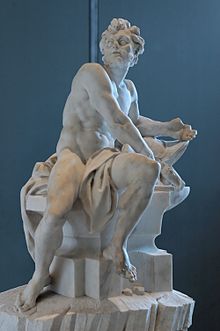Hephaestus
| Hephaestus | |
|---|---|
God of fire, metalworking, stone masonry, forges, the art of sculpture, technology and blacksmiths | |
| Member of the Twelve Olympians | |
 Hephaestus at the Forge by Guillaume Coustou the Younger (Louvre) | |
| Abode | Mount Olympus |
| Symbol | hammer, anvil, tongs |
| Personal information | |
| Parents | Zeus and Hera, or Hera alone |
| Siblings | Aeacus, Angelos, Aphrodite, Apollo, Ares, Artemis, Athena, Dionysus, Eileithyia, Enyo, Eris, Ersa, Hebe, Helen of Troy, Heracles, Hermes, Minos, Pandia, Persephone, Perseus, Rhadamanthus, the Graces, the Horae, the Litae, the Muses, the Moirai |
| Consort | Aphrodite, Aglaea |
| Children | Thalia, Erichthonius, Eucleia, Eupheme, Philophrosyne, Cabeiri and Euthenia |
| Roman equivalent | Vulcan |
| Canaanite equivalent | Kothar-wa-Khasis[1] |
| Part of a series on |
| Ancient Greek religion |
|---|
 |
|
Hephaestus (/hɪˈfiːstəs, hɪˈfɛstəs/; eight spellings; Greek: Ἥφαιστος, translit. Hḗphaistos) is the Greek god of blacksmiths, metalworking, carpenters, craftsmen, artisans, sculptors, metallurgy, fire (compare, however, with Hestia), and volcanoes.[2] Hephaestus's Roman counterpart is Vulcan. In Greek mythology, Hephaestus was either the son of Zeus and Hera or he was Hera's parthenogenous child. He was cast off Mount Olympus by his mother because of a congenital impairment or, in another account, by Zeus for protecting Hera from his advances.[3][4][5]
As a smithing god, Hephaestus made all the weapons of the gods in Olympus. He served as the blacksmith of the gods, and was worshipped in the manufacturing and industrial centres of Greece, particularly Athens. The cult of Hephaestus was based in Lemnos.[2] Hephaestus's symbols are a smith's hammer, anvil, and a pair of tongs.
Etymology[]
Hephaestus is probably associated with the Linear B (Mycenaean Greek) inscription